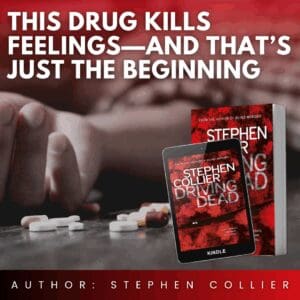From Rubber and Blood to Bureaucratic Blame
 My second book in the Jordan Kingsfield trilogy, Driving Dead, is a crime novel that doesn’t stop at crime. Beneath the road collisions, foot chases, and forensics lies a fierce indictment of how modern institutions reward the wrong things and punish the people who actually do the work. At its heart is Jake Jordan—a man who did everything right, yet finds himself left behind, bruised by a system that claims to honour duty but recoils from imperfection.
My second book in the Jordan Kingsfield trilogy, Driving Dead, is a crime novel that doesn’t stop at crime. Beneath the road collisions, foot chases, and forensics lies a fierce indictment of how modern institutions reward the wrong things and punish the people who actually do the work. At its heart is Jake Jordan—a man who did everything right, yet finds himself left behind, bruised by a system that claims to honour duty but recoils from imperfection.
Failure does not derail Jake’s career, but it is because of his refusal to play the political game. When he defied orders during the pursuit of Bingham Tyler—a ruthless murderer—it was not out of ego, but urgency. He stopped Tyler’s rampage. He saved lives. However, rather than being celebrated, reprimanding Jake was his reward. Meanwhile, his colleagues climbed the ladder. Promotions went to those who kept their hands clean, not to those who took the risks.
This bureaucratic betrayal is a recurring undercurrent in the novel. Jake watches others reap rewards while he’s stuck with paperwork, pain, and public silence. The system he once believed in has evolved into a machine that prioritises its image above all else. The road policing unit, with its flashy infrastructure and hollow reforms, becomes a symbol of this shift. Public relations and political optics often obscure real justice.
Through Jake’s internal monologue, readers get a front-row seat to the frustration. He isn’t bitter for no reason. He’s angry because he still cares. That’s the tragedy. He wants to do good. He still believes in service. But the more he pushes forward, the more he is reminded that merit doesn’t matter when systems are broken from the top down.
The novel effectively conveys this point through sharp contrasts. While past trauma and juggling haunt Jake’s mental strain, others seem to glide through their careers untouched by either consequence or conscience. The polished public face of the department—the gleaming multi-agency complex, the administrative jargon, the parade of task management systems—stands in stark opposition to the bloody reality of roadside fatalities and broken families.
I try to pull readers into its daily grind. We see Jake navigating a maze of reporting software, accountability protocols, and media posturing while trying to solve a fatal crash that may not be accidental. Every action is watched, every word weighed. And yet, the people most affected by the crimes, the victims, the families, even the responders, feel like footnotes.
What Driving Dead shows us is a world where bureaucratic insulation becomes a form of violence. It smothers initiative. It punishes empathy. It turns heroes into liabilities. And it leaves people like Jake to either burn out or break down.
But there are moments of resilience. Jake does not give up. He investigates, he questions, he persists. Not because he’s rewarded for it, but because it’s the only way he knows how to live. In doing so, the novel reminds us that justice doesn’t survive in systems. It survives in people who refuse to stop chasing it, even when it no longer chases them back.
Driving Dead is a story for anyone who has ever been told to sit down after standing up. It’s a call to remember that institutions are only as just as the people who hold them accountable—and those people are often the ones the system forgets. For readers who want a thriller with meaning and a hero who speaks for the unrecognised, this novel is one to remember.
